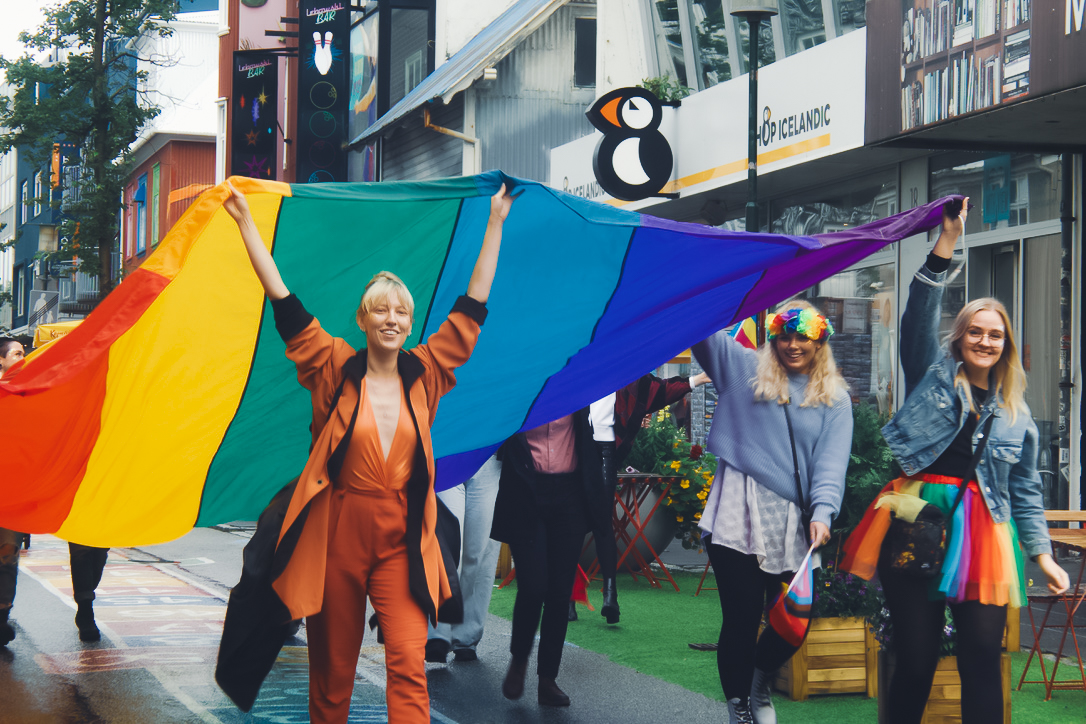In a post COVID world, connection and belonging are incredibly important, especially if you’re a member of the queer community. There have been many groups formed over the years within Iceland that help people to find their tribe, connect with like-minded individuals or even just have a conversation in a safe space. These kinds of connections aren’t just nice, they’re important.
A few years ago, some members of the community decided it was time to establish a women’s evening in Reykjavík. The nights have managed to survive a pandemic and are still going strong. Today the Women’s Nights have gone through a bit of a rebranding to become more inclusive and I had a chat with two members to get the low down on all this and more.
Ástrós Erla Benediktsdóttir is the founder and CEO of ‘Vera,’ the events group formerly known as ‘Queer Ladies Night’. Outside of the group she works as a counseller for Samtök 78, The Natioanl Queer Association of Iceland, she also travels around Iceland giving queer education to students, when she’s not teaching yoga or working as a healer. Ástrós felt like something like this was needed for a while and decided to do something about it back in 2019.
So what inspired her to create this group?
Ástrós: “Back in 2019 I had come back from New York where they had all these queer events for women. I came back to Iceland and they had nothing here at all and there hadn’t really been anything for the last five years at least.v
Fellow board member Hrönn Svansdóttir also remembers that there weren’t a lot of options for queer women to meet other queer women in the past.
Hrönn: “I’ve been involved with a lot of events in the queer community in the past. My involvement goes way back to the days of the bars Trúno and Barbara Sunshine (where bar Bravó is now in Reykjavík), then Kiki and (drag group) Drag-Súgur. Me and Alda Karen also had some nights called Les-be-honest.”
How did you initially get the group started?
Ástrós: “So I got some women together and decided to start an event which, at the time was called ‘Queer Ladies Night.’ I just kind of assumed that it was needed because we didn’t have anything. I knew about all these queer women out there. I personally didn’t have a group, everyone I knew was someone I had dated or been with and that was kind of it.
From all of the people that I knew it was the general consensus, so that’s basically what made this all happen.”
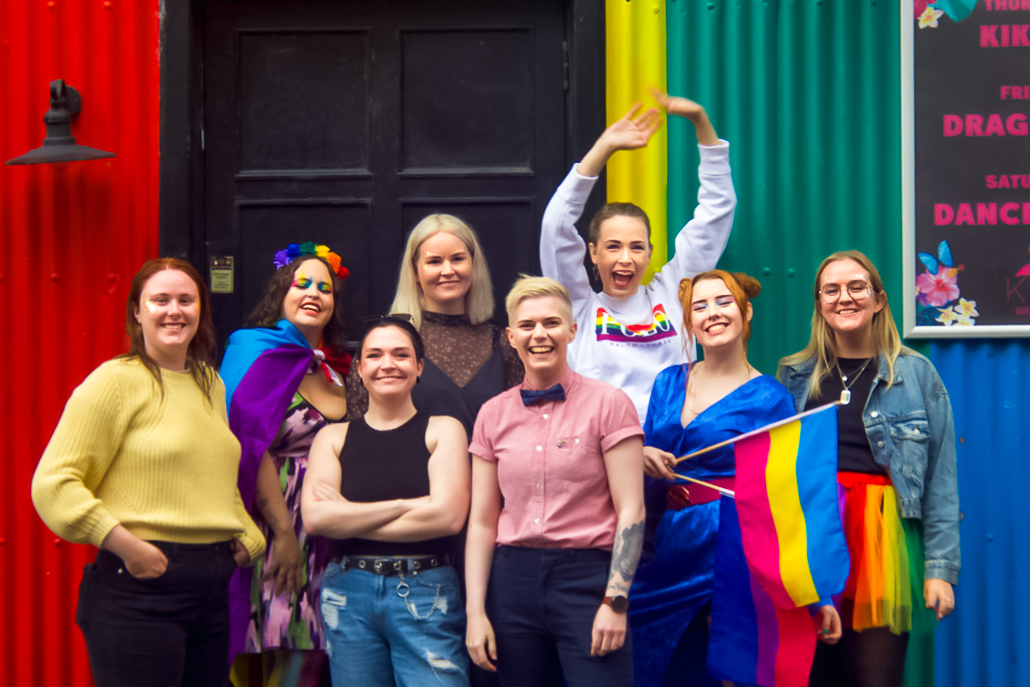
And how did the first night go?
Ástrós: “On the first night we held in June 2019, we had 120 people come so that pretty much cemented to us that it was something people both wanted and needed.v
And since then, how many events have you had?
Ástrós: “We’ve almost made it a year. Obviously COVID slowed things down a bit but I think we’ve at least had 10 so far. During COVID, we moved things over to social media. We opened our insta story to members so if they wanted to come and tell the rest of us a little bit about themselves they could. That was pretty successful too. We had more than 60 people come on and tell their stories. That was really nice. It was nice to give people a chance to introduce themselves but we also saw that people really loved to hear the stories of other people in their community.
“We had no idea how many people would have interest in this so we were really pleasantly surprised to have it embraced so well.”
It sort of blew up a bit too, in that short period, our instagram profile ticked over 1000 followers. We really saw a lot of people who had never come to the events communicating and staying in touch over the internet which was really positive to see.”
You’re both very community minded people, was this a surprise for you to see such a huge response to this.
Ástrós: “Yeah for sure, we had no idea how many people would have interest in this so we were really pleasantly surprised to have it embraced so well, but it was also nice to receive the positive feedback. People were overwhelmingly happy to finally have something like this. To have a space just to meet other like-minded people.”
Hrönn: “And as a board member, who’s also been around the queer community for a while it’s a nice surprise to see so many new people coming in all the time. Even at our last event we had about 5 or 6 newcomers who had never been to an event before.”
Can you tell us why it’s important for queer women and non-binary people to have a space or events like this?
Ástrós: “I think the primary reason it’s important to have events for us is because we have similar issues we face, many of us are going through the same things. I think having a space where it’s safe to talk and discuss things like this without judgment helps to create a feeling of belonging. Of course we would love to have the entire queer community together but it’s also important to give people a chance to be with those who have more shared experiences.
In this group there’s a wide range of people who identify in different ways. We’ve also noticed that by having a group like this, it’s created a space where people can also talk about their experiences, clear the air and learn from each other. Ultimately it’s about creating a space where members feel both included and welcomed.”
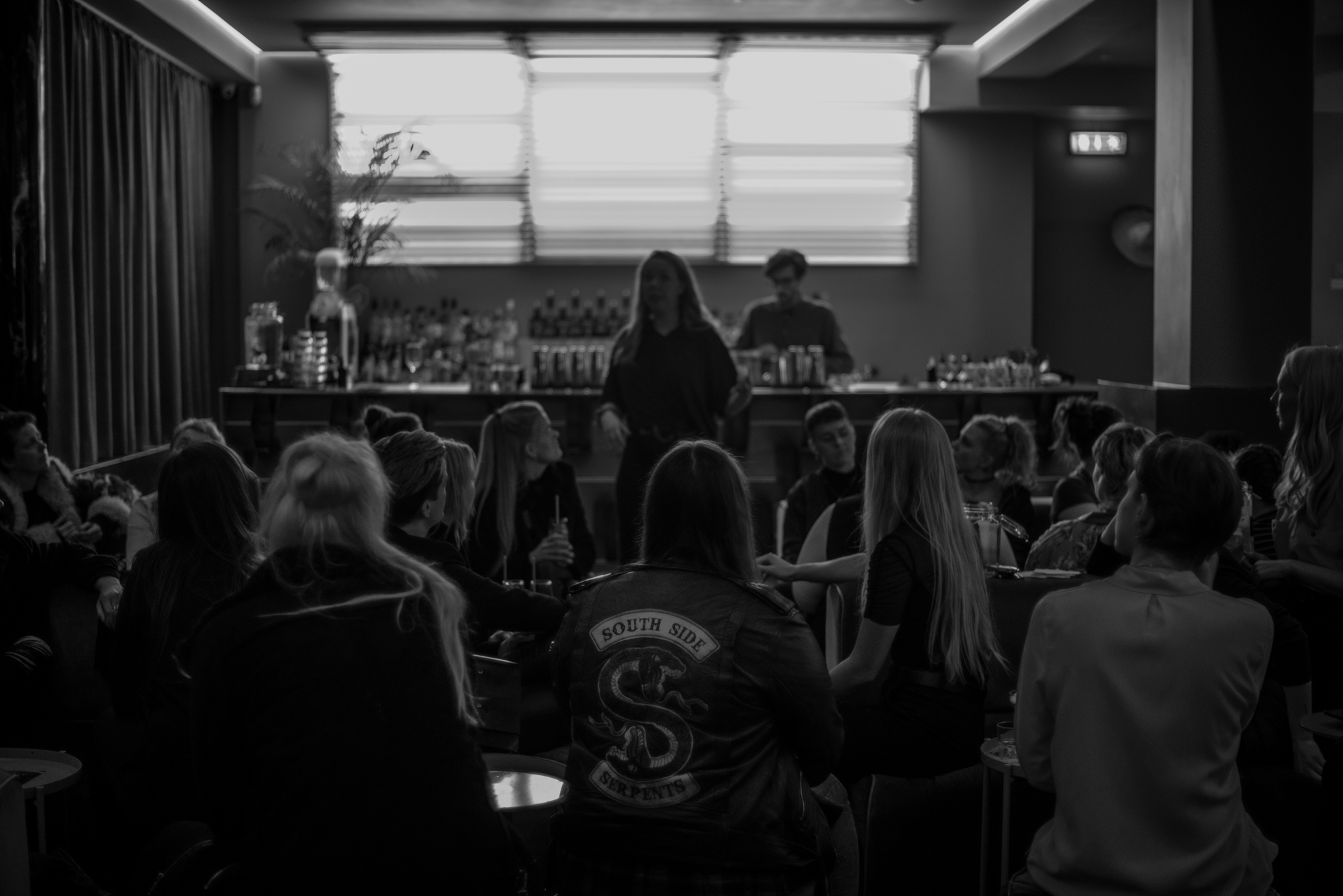
As Ástrós and Hrönn explained, the events were originally titled ‘Queer Ladies Night,’ but a change that was made to make the group also inspired a name change.
The Group is now called ‘Vera.’ So why did you choose that word? What does it mean and what’s the relevance?
Ástrós: “Initially when these events started, they were about women who were attracted to women. Over time we were asked by some members of the community who identify as non-binary if they could also be included and the answer was yes, so now the group events are all about women and non-binary people.
We obviously decided that we also needed to make the name of the group more inclusive too and thought long and hard about what we would change it to. We really wanted to choose a name that reflected the values of the group and settled on Vera. It is a female name in Icelandic, but we’re not using it in that way. Vera is also a verb (að vera) which is the verb ‘to be.’
“Over time we were asked by some members of the community who identify as non-binary if they could also be included and the answer was yes, so now the group events are all about women and non-binary people.”
We like it because we are all beings. We’re all the same but still so different. I think the name really encapsulates how we are all different but we can still come together in a sort of union based on shared experiences.”
In the past you’ve had some events that have been at bars and cafes, but have you also held events in places outside of the cafe or bar scene?
Hrönn: “Yes for sure. The group had a hike during COVID. It was a full hike with a guide and everything. We also had a few Zoom gatherings. We are definitely trying to make sure the events are varied and not always in the same kind of place.”
Is it fun trying to think of different things to do in the future?
Hrönn: “Yes definitely, we’re always trying to think of new and exciting things to do. Like maybe in the future it would be great to have a movie club or a book club. We’d really like to create the opportunity to work with common interests and make sure that things aren’t centered around drinking and alcohol. It’s about the connection.”
Ástrós: “We also want to make sure things stay open enough that younger people can join. There are youth programs in Iceland but they basically stop at 17. In Iceland the legal drinking age is 20 so if you only have events in bars, there’s a whole bunch of people between 18 and 20 who can’t always be included.”
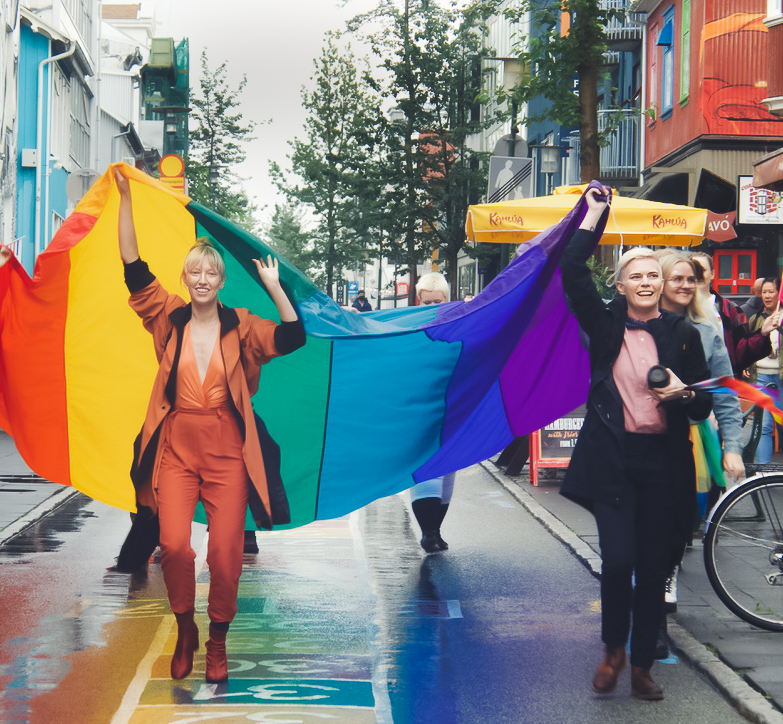
So you both grew up in Iceland as queer people, do you think things could have been better for you if there was something like this when you were younger?
Ástrós: “Definitely. When I was growing up there wasn’t anyone I knew who was queer. If I head about someone that was queer, it was always just something I’d heard about second hand and it wasn’t necessarily spoken about in a positive way. So that really affected my own coming out story. I came out much later than I think I would have if I had grown up today and had access to stuff like this.”
Hrönn: “It was the same for me. I came out in 2007 and at the start I was really ignorant to the entire spectrum of people out there. I mean I remember that I had seen lots of different kinds of gay men on TV when I was younger, but the only queer female representation I had seen was Ellen.”
As the interviewer and writer of this article I would also like to say on behalf of cis gay men everywhere I’m sorry that we have hogged the spotlight for so damn long.
Where would you love to see this group go in the future?
Ástros: “One of our board members is in contact with groups in other countries and we really would like to involve more people and work in being more inclusive of people from other countries. For example, here in Iceland we have so many people within our community from other countries that we just haven’t been able to reach yet. We just want to be as visible as possible so that more and more people can find us, come join us and feel like they belong.
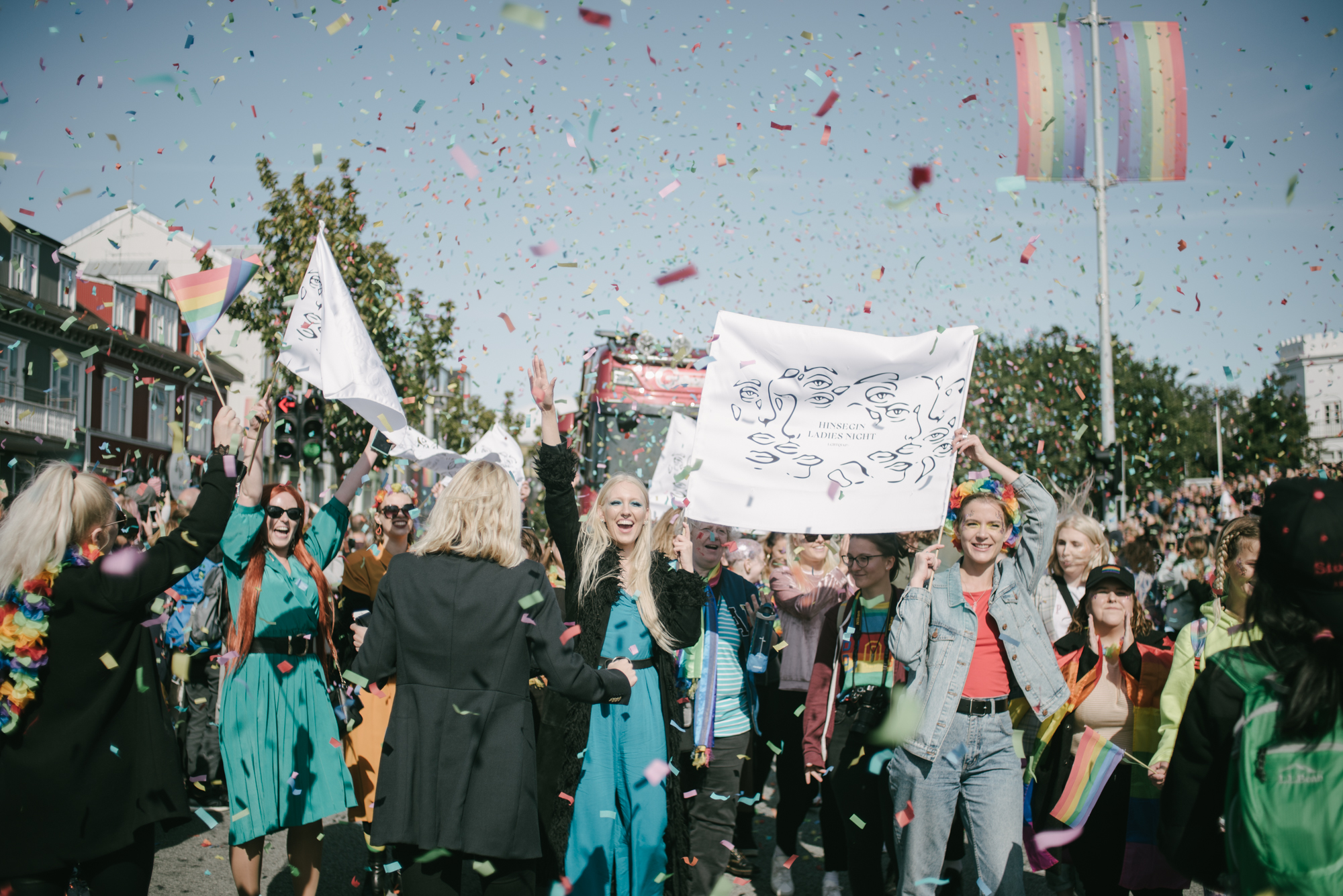
We’d also love to be able to connect with people and groups in other countries and help out wherever we can. There’s so many places that have it much harder than we do here in Iceland and we would love to help out. But we’d also love to just go to other countries and have fun too. Maybe we could have an exchange, where a group from another country comes to Iceland and we show them a good time, then we go visit their country and do the same.”
So it’s been pretty successful so far?
Ástrós: “Yes for sure and I think I would definitely say because of COVID we had a bit of a slow down, but since June we’ve had our new board instated and things are really starting to take off again.”
And who are the locals on the board?
Hrönn: “I’m part of the board and we also have Glóey Þóra Eyjólfsdóttir, Sólveig Johnsen, Anna Katrín Guðdísardóttir, Birta Líf Bjarkadóttir, Tinna Haraldsdóttir and Arna Rún Grönvold.”
Ástrós: “Then we have Ingibjörg who’s doing all the international stuff and I’m more of a behind the scenes person.”
So if someone wants to get involved, how do you suggest they start?
Hrönn: “Well we have both Instagram and a Facebook group, Vera – hinsegin félag kvenna og kvára, we post all of our events on Facebook and in our stories on Instagram.”
“We know what you’re going through and we know what it’s like. We’re friendly and we would love to get to know you.”
If you could think of your young selves, wishing that there was something like this happening in Iceland; if you could think of anything to say to that young person to encourage them to come along to an event what would it be?
Hrönn: “I think just that we’ve all been in your shoes. We’ve all been the only queer person in the friend group. We’ve all had to step out of our comfort zones to find people like ourselves that we can connect with. We know what you’re going through and we know what it’s like. We’re friendly and we would love to get to know you.”
Ástrós: “I think mine would be really similar. Just know that you’re not alone and we really make sure that everyone who comes feels welcome. We go out of our way to make sure that nobody ever feels isolated or left out. It’s so important that our members and guests come to our events and feel welcome.”
Vera is continuing to create events and is making plans for some exciting things over Christmas and the New Year. The next event is taking place this Wednesday, November 3rd. You read all about it by clicking here.

